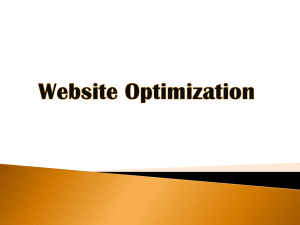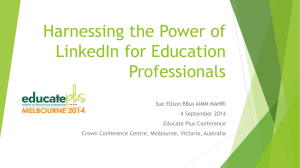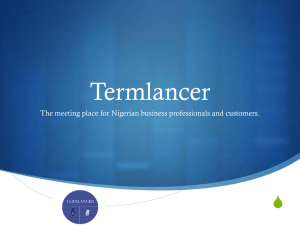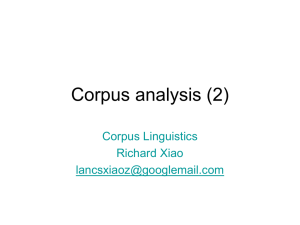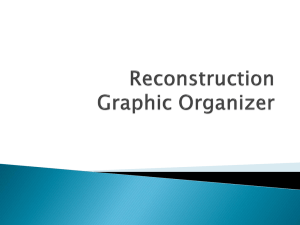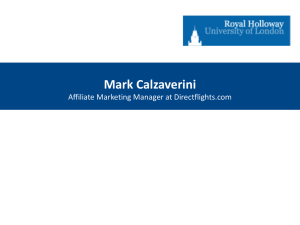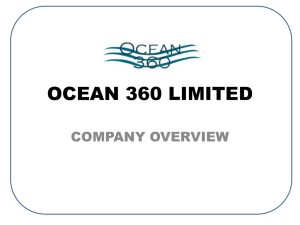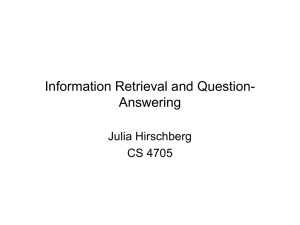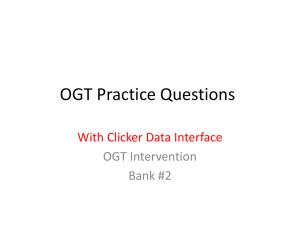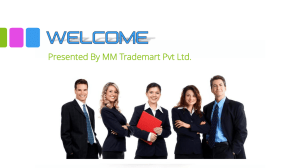Market–Research-Driven-Keyword-Research
advertisement
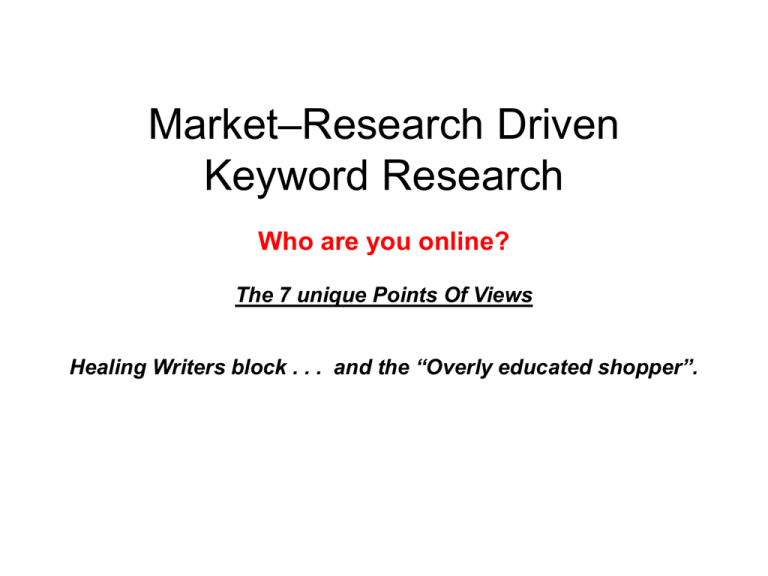
Market–Research Driven Keyword Research Who are you online? The 7 unique Points Of Views Healing Writers block . . . and the “Overly educated shopper”. The end of “the snake oil days” for search engine optimization? Yes! The beginning of VEO (visitor enhanced optimization) as discussed by Colin McDougall in the VEOreport? Yes! THEME ZOOM Why was TZ created? A deadly cocktail of two reasons: • The “overly educated shopper” epidemic Combined with: • A sudden boost in Artificial Intelligence from the search engines called Latent Semantic Indexing. Latent Semantic Indexing http://www.seobook.com/lsi/cover_page.htm Search engines are becoming artificially intelligent! They are starting to not only understand what you say . . . But also what you mean! The “overly educated shopper” Search engines (and the Internet) have created an epidemic of longer buying cycles. CONSUMERS ARE OFTEN SMARTER THAN YOUR SALES STAFF! Yikes! People research for 2 months before (and if) they ever trust you. The “overly educated shopper” • The internet is primarily used by people as an intelligence gathering tool. • In a survey performed by marketing today 1,500 business professionals took a survey and confessed: 1. They spend over 4 hours online including time at work. http://www.marketingtoday.com/emarketing/0305/b2b_importance_sem.htm The “overly educated shopper” • The internet is primary an information retrieval system. In a survey performed by Marketing Today 1,500 business professionals took a survey and claimed: 1. 2. They spend over 4 hours online including time at work. 93.2% claimed they go online to research about products first. The “overly educated shopper” • The internet is primary an information retrieval system. In a survey performed by marketing today 1,500 business professionals took a survey and claimed: 1. 2. 3. They spend over 4 hours online including time at work. 93.2% claimed they go online to research about products first. 63.9% use the search engines, primarily Google, to do so. The “overly educated shopper” • The internet is primary an information retrieval system. In a survey performed by marketing today 1,500 business professionals took a survey and claimed: 1. 2. 3. 4. They spend over 4 hours online including time at work. 93.2% claimed they go online to research about products first. 63.9% use the search engines, primarily Google, to do so. 60% of those buyers are making purchases in excess of $10,000 dollars and start research up to 2 months in advance. The “overly educated shopper” • The internet is primary an information retrieval system. In a survey performed by marketing today 1,500 business professionals took a survey and claimed: 1. 2. 3. 4. 5. They spend over 4 hours online including time at work. 93.2% claimed they go online to research about products first. 63.9% use the search engines, primarily Google, to do so. 60% of those buyers are making purchases in excess of $10,000 dollars and start research up to 2 months in advance. 46% of the searches are early in the process with little or no product knowledge. The “overly educated shopper” • The internet is primary an information retrieval system- NOT primarily a BRAND BUILDING device. In a survey performed by marketing today 1,500 business professionals took a survey and claimed: 1. 2. 3. 4. 5. 6. They spend over 4 hours online including time at work. 93.2% claimed they go online to research about products first. 63.9% use the search engines, primarily Google, to do so. 60% of those buyers are making purchases in excess of $10,000 dollars and start research up to 2 months in advance. 46% of the searches are early in the process with little or no product knowledge. 74.5% of searchers choose organic listings over paid. The “overly educated shopper” • The internet is primary an information retrieval system. In a survey performed by marketing today 1,500 business professionals took a survey and claimed: 1. 2. 3. 4. 5. 6. 7. They spend over 4 hours online including time at work. 93.2% claimed they go online to research about products first. 63.9% use the search engines, primarily Google, to do so. 60% of those buyers are making purchases in excess of $10,000 dollars and start research up to 2 months in advance. 46% of the searches are early in the process with little or no product knowledge. 74.5% of searchers choose organic listings over paid. 30% are in the comparison phase. Johns Smith Online • If you want to know why John Smith buys what John Smith buys, you’ve got to see the world through John Smith’s eyes. F-scan Eye scan patterns below. http://www.eyetools.com/inpage/research_google_eyetracking_heatmap.htm Ultimately high Pay Per Click outspends are a band-aid solution for lack of content equity. SEO gets a bad rap • “I believe it is the confusion about this that has lead to SEO (search engine optimization) having a bad rap. SEO’s confuse tactical and strategic marketing- passing that “inner reality” on to the client.” • Seldom do results match expectation during the SEO (SEM) boombecause STRATEGY is too hard to explain to the average client. • . . . and the average client wants TACTICAL (instant) sales results. • That is how unmonitored and wanton Pay Per Click addiction came to exist. The illusion of long term success through an apparently direct marketing medium. What is marketing supposed to do? 1. Capture the attention of the target audience. (Beta Interrupt). 2. Facilitate the prospects information gathering and decision making process. 3. Lower the risk of taking the next step in the sales cycle. The Internet is low risk: • The internet is a content-driven, low-risk, research-based, pressure-free, DEFENSE against all sales methods. Mental spam filters are increasing by the year. Pay Per Click versus Educational Process (good content) Strategy versus Tactic • Pay Per Click = Tactic • Pay Per Click = test a market • Pay Per Click = direct response • Pay Per Click = sales page driven • Pay Per Click = 10% fraud or more. Visit: http://www.marketingexperimentsblog.com for more details. These folks are claiming up to 20% fraud ON AVERAGE when it comes to PPC. Strategy versus Tactic • • • • • Natural Content = Strategy Natural Content = educate a market Natural Content = own the first impression Natural Content = build trust Natural Content = position yourself as subject matter expert. • Bypass the ever-increasing mental spam filters by distinguishing yourself from trivia. 1. The Entrepreneur • In this case you ALREADY have your own product, information product, or service. Variations: • You have a money site already and want to expand your themes. • You are planning to have a direct marketing site and already have a successful offline products and services. Adsense and affliliate level income is meaningless to your value system. 2. Novice Entrepreneur • In this case you DO NOT already have your own product, information product, or service. Variations: • • You DO NOT already have a money site and searching for Niches. You are planning to have a direct marketing site and do not have a successful offline business product or service. 3. Affiliate • In this case You are selling someone else's product, information product, or service and are making money. Variations: • You have a personal, well thought-out sales page (click-bank etc.), that sells one affiliate product. (affiliate money website). • You have a product review website with quality information that sell multiple affiliate products. • Your Adsense revenue is of secondary importance to you, or of zero importance. • Your Adsense revenue is of PRIMARY importance to you. 4. Hopeful Affiliate • In this case You are you are not yet selling someone else's product, information product, or service. Variations: • You are still looking for the "perfect niche" or affiliate product to sell. You havn't started building portals yet. You spend a lot of time looking for the perfect "untapped" market. • You have several hundred dollars worth of "keyword tools“ but have had little or no success making money online. • You are not yet making money. 5. Non-Profit • In this case You are a 501c3 not-for-profit organization trying to increase traffic to your website or network of sites. Variations: • All of this marketing jibberish makes no sense to you and you barely follow me. • You are promoting non-profit messages, doctrines, and ideas online with no real web structure or know-how but you understand marketing and basic web marketing. • You feel that many online marketing rules do not apply to you and are trying to figure out which ones (if any) do. • You are highly structured, operating your optimized 501c3 non-profit webring or website with business savvy and are flooded with traffic. 6. The Writer • In this case you are a writer or a content producer who is starting to get the picture about Latent Semtantic Indexing. Variations: • You are starting to understand that writers are going to someday rule the search engines and would like a head start. • You want your content to outlast the search engine transition into audio and video. • You want a way to become a subject matter expert using Search Engine Approved synonyms. • You want to cure writers block by knowing what subject matter expertise the market demands. 7. The recovering Pay Per Click addict. • In this case you are spending way too much money on Pay Per click advertising without any movement towards someday owning the keywords you are paying for. (Ouch). You are ready to heal. Variations: • You finally realize that your website has content equity and increases in value over time by reducing the need to PAY for traffic. • You are tired of paying huge prices on Pay Per Click without even knowing if you are duplicating expenses on the natural search engine listings. • You understand the long term success of natural rankings over the short term success of Pay Per Click • Welcome Home! Which are you? 1. 2. 3. 4. 5. 6. 7. The Entrepreneur Novice Entrepreneur Affiliate Hopeful Affiliate Non-Profit The Writer The recovering PPC addict? Stop the Show • Which Category do you fit into? There are unique Theme Zoom techniques that can be customized to your unique case. Lifting the keyword confusion. Everything you ever wanted to know about market driven keyword research, (but didn’t know you were supposed to ask). Keep it simple 200 million daily Google Searches Amit Singhal (head information retrieval engineer) at Google claims that over 50% of the 200 million daily searches on Google are unique. Missing Sales • This means 50% of the online searches are the same old keyword phrases. • Amazingly the second 50% of searches are completely unique requests, or they are people looking for the SAME products and services in a completely different way. (Phrased differently) Missing Online Customers • This makes online keyword behavioral research as important as keyword popularity research. • Popular keywords are more expensive and more competitive than any other kind of keyword. It is best to find unique additional keywords that convert sales. • Don’t get stagnant with your keyword list. Theme Zoom Proprietary Keyword System Learn about your online market with 7 keyword types: 1. Contextual keywords (current visible content and tags) 2. Effective keywords (already used to find your site) 3. PPC keywords (keywords already in campaign) 4. Exotic keywords (discovered from drill down) 5. Money keywords (already closed sales) 6. Swiped keywords (borrowed from competitors) 7. Invented keywords (water cooler untested ideas) These is your Customized Keyword Database Contextual Keywords Contextual keywords make up the overall content theme of your website. Not the same as single page keyword density analysis. Expensive Popular Terms • Theme Zoom is designed to help you develop content equity for expensive keywords so that you may eventually own them on natural search while still driving your business via PPC if necessary. . Furthermore • Theme Zoom will help you develop a mindset that prevents duplicate spending and helps you to dominate your niche. Ultimately high Pay Per Click outspends are a temporary solution for a content problem TZ Rewards • We want your website to survive and THRIVE in the era of the “overly educated shopper”. • We KNOW the changes that are coming down the pike. Speech retrieval is coming: http://singhal.info/ LSI (latent semantic indexing) is only the beginning of the AI revolution. • • Audio and Video will dominate the search engines. This means that the search engines will become MORE educational than they already are. • Google Video is still in Beta, but our associates are receiving huge amounts of traffic from people searching for educational materials who later PAY for products based on Authority Criteria. ( They view the teacher as trustworthy).
